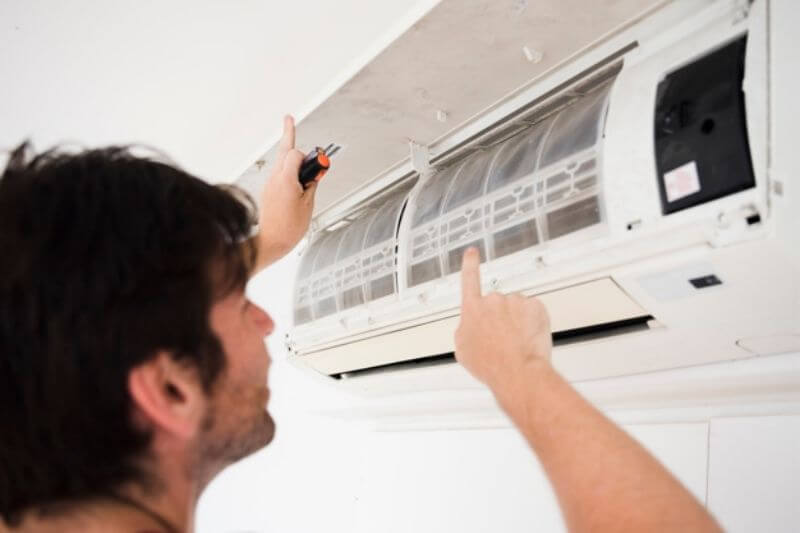How To Troubleshoot HVAC Malfunctions

Have you noticed that your house if abnormally hot? This signifies that your HVAC system has a problem and can no longer cool the house as sufficiently as it used to. For most people, any problem with HVAC systems spells enormous replacement costs, and they don’t know that a simple DIY can solve it. While some HVAC problems are easy to navigate and solve even without training, some cases require expert attention, inspection, and cracking.
Below we will look at eight common problems that can affect your system and how you can quickly troubleshoot the malfunctions and maintain your home’s comfort.
Clogged drains
Can you hear the HAVC system’s quiet hum, but your house is still not cooling down? It is a sign that your system is working, but not functioning optimally. This might be due to impurities such as dust and feathers clogging the drain pipes.
Since drains are a sensitive part of the system, it is essential to consult a professional technician to clear out the clog. Failure to clean the drains can lead to a severe electrical short circuit risk in case the AC water backs up. Dayton HVAC recommends that always keep your house dust free and clean any pet fur lying around, which can be collected by your system, thereby causing a clog.
Dirty filters
The purpose of an air filter in an HVAC system is to let clean airflow into the system smoothly. In case the filter clogs with impurities, air will not circulate properly, leading to insufficient and impure air circulation.
Most air filters have a lifespan ranging between 30-60 days, depending on your system’s usage when cooling your house. A clogged filter should be changed instead of cleaning, which will help save on your electricity consumption and improve your house’s air quality.
Problems with your system’s sensor
If your system’s drains and filters are working well, or recently replaced, but your system still doesn’t cool your house, it is time to check if the sensor is well connected and working. For wall-mounted units, check the sensor to ensure that it’s still attached to its chamber and the power connectors are in place.
In case someone tampered with the wires, gently connect them back to their place and restart the whole system. For malfunctioning sensors, consult an HVAC professional who will troubleshoot and advise whether you need a replacement.
Low refrigerant levels and leaks
A HVAC system’s refrigerant is responsible for cooling your house. Leaks or low levels of the refrigerant force the system to work inefficiently. Common signs for low levels of refrigerant liquid in the system are when the system blows out warm air, or when you observe condensed water around the furnace area, or on the ground. It is also possible to have ice building up around various system cables, such as the copper cables that run around the conditioner.
Due to the refrigerant refill’s complexity, you should seek a professional HVAC technician’s services to seal any leaks and recharge the system to restore adequate refrigerant levels. This will help save on your electricity bills.
Unusual noises
A normal operating system should have a barely audible hum, usually emanating from moving fans. Loud noises such as hissing sounds, rattling noises, screeching sounds, and banging noises are a clear indication of failing motors or broken blower motors.
Other causes of loud noises can be problems in the air intake compartment or clogged burners. You might want to replace any moving part that makes out of ordinary sounds, as their continued use may lead to more severe problems for the system, such as furnace break down. Consult a certified technician for advice in case you need to replace any part.
Blown fuses and tripped power breakers
If your system overworks, it can lead to a blown a fuse due to the huge power surge. This overload on the system might be a result of clogged airways, which force the fans to blow harder to pass enough air through the system. To troubleshoot a defective fuse, check your system’s airways and fans to ensure they are clean and working correctly.
In case the problem persists, be sure to schedule an HVAC technician’s service. It is necessary to consult your electrician in Moffat Beach to know if a problem outside the system causes the surge.
Malfunctioning thermostat
Is your AC running, but your house still feels hot and stuffy? It may be a problem with your system’s thermostat. A dead thermostat causes escalated energy bills from irregular temperature regulation. On the other hand, if the system is on, with the thermostat set at 40, the temperature feels 105, it points to a malfunctioning thermostat.
The first step to troubleshooting the thermostat is by resetting it to the default system and observing the temperature change. If this does not help, it is essential to consult a professional who will decide on whether to replace the thermostat or repair it.
Water leaks
If an HVAC system does not have well-done drainage mechanisms, it may lead to water leaks, as the condensate sips through the drain pipes. One of the common causes of this problem is clogged pipes, which force condensed water to overflow and spill into the drain pan.
The first step to work around this problem is pouring bleach through the drainage to clear out any clogged particles. You may also repair any broken pipes through which the condensate spills. Before troubleshooting starts, the pipes should all be cleaned, exposing any broken points. You should also put more focus at the leaking points.
Repairing an HVAC system or replacing the whole unit can be very expensive. That said, you should keep a well-maintained system is, and schedule regular checks with technicians. Additionally, if you notice any of the above pointers take immediate action.











Leave a Reply